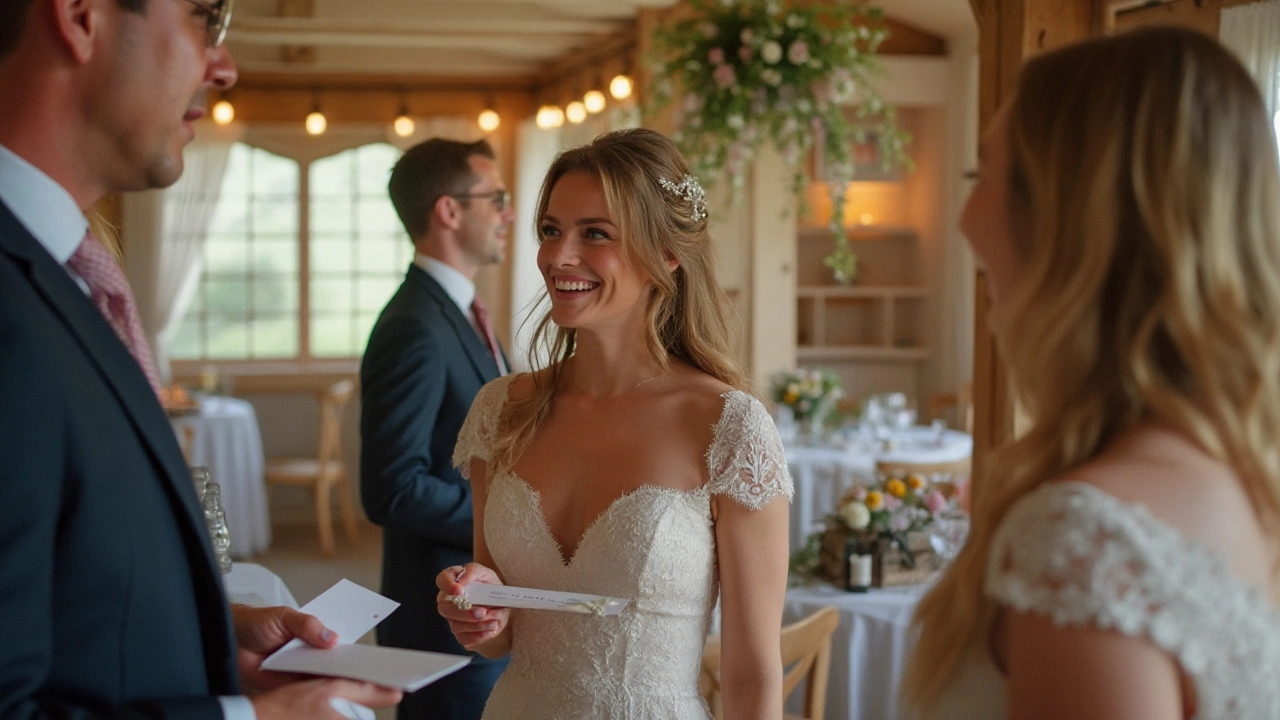Planning a wedding is a whirlwind of decisions, and one of the key components is setting the RSVP deadline for your guests. The RSVP timeline isn't just about giving guests time to reply; it’s also about ensuring you have enough time to organize seating plans, catering numbers, and other logistical details that depend on the final headcount.
Whether you're coordinating a simple affair or a grand extravaganza, knowing when to set your RSVP deadline can make all the difference. Let's dive into the nitty gritty of scheduling RSVPs to help you achieve a well-planned, stress-free celebration.
- Determining the RSVP Deadline
- Standard Practices for Typical Weddings
- Considerations for Destination Weddings
- Managing RSVP Responses Effectively
- Dealing with Late RSVPs
- Tips for a Smooth RSVP Process
Determining the RSVP Deadline
When planning your dream wedding, choosing the right timeline for your RSVPs is a crucial step. It's a balancing act between giving guests ample time to consider their attendance and securing a definite headcount for your wedding vendors. Generally speaking, etiquette experts suggest setting the RSVP deadline about four to six weeks before the wedding date. This period allows you to finalize crucial decisions about catering, seating, and other logistical arrangements without unnecessary stress.
The importance of the RSVP timeline can't be overstated. A common recommendation is to send out wedding invitations around eight to twelve weeks in advance, particularly for local events. This timeline gives guests adequate time to arrange their schedules and respond to your invitation. Meanwhile, your caterer and venue typically need final numbers and special dietary requests confirmed about two weeks prior to your event. This ensures you have a smooth decision-making period, where adjustments to the final guest list can be made efficiently.
The renowned wedding planner David Tutera once said, "Timing is everything when orchestrating a big event like a wedding."
For destination weddings, your timeline may need modification. With the added complexity of travel, accommodation, and potentially time off work, setting the RSVP deadline three to four months before the event isn't uncommon. This extra time helps guests make necessary travel arrangements, ensuring more certainty in your headcount early in the process.
While establishing an RSVP deadline, consider the personalized relationships with your guests. A friend's uncertain job situation or family obligations might mean they need a little extra time to affirm their attendance. Knowing your guests and their specific circumstances can be pivotal in deciding when to set that final deadline. Finally, clear communication is essential. Include all necessary details on the invitation itself – from how and where to reply to the importance of adhering to the deadline – to avoid any confusion. Being specific not only helps your guests but also ensures a seamless ushering from invitations received to RSVPs collected.
Standard Practices for Typical Weddings
When it comes to setting deadlines for RSVPs, traditional weddings usually follow a timeframe aimed at providing enough breathing space for both the hosts and the guests. A typical practice is to request RSVPs about four to eight weeks before the wedding date. This time frame allows guests to check their schedules and make necessary arrangements while giving you ample opportunity to finalize headcounts for caterers and seating plans. It's also considerate of everyone’s schedule, acknowledging that people often have other commitments and need time to plan around your event.
One of the primary considerations in setting your RSVP timeline is your chosen venue's policy. Many venues and vendors ask for finalized guest numbers about one month prior to the wedding, which makes having a deadline of at least six to eight weeks in advance a prudent strategy. This provides a buffer for guests who reply close to the deadline and allows the couple time to handle any unresponsive guests. A general rule of thumb is to send out invitations three months prior to the wedding with an RSVP deadline set about six weeks before the big day.
"Making sure people have enough time to RSVP is one of the kindest things a couple can do," suggests wedding planner Julia Blumenstock, "because it respects their priorities as well."
While these timelines are standard, there's no harm in customizing them to fit your specific needs or the needs of your guests. If your wedding is during a popular holiday or in a heavily booked wedding season, consider asking for RSVPs even sooner to ensure better availability for necessary services. Additionally, setting an early RSVP date can help pinpoint guests who might require travel accommodations, allowing you to offer assistance or discounts if available. Keep in mind that the earlier you can secure a final headcount, the smoother the planning process will be.
Communication is key. Many couples opt to include a variety of ways guests can RSVP, both to accommodate different preferences and minimize last-minute responses. Providing both electronic and paper response options can cater to different ages and technological comforts among your guests. Be clear in your invitations regarding the deadline and the methods available for guests to RSVP, and consider following up with a friendly reminder as the date approaches to catch any stragglers. Clarity and ease of response can significantly impact the timeliness of replies.

Considerations for Destination Weddings
Destination weddings are a romantic dream for many couples, providing not just a celebration, but a memorable escape for everyone involved. However, they require more intricate planning than local ceremonies. When determining how much time to give for RSVPs, you must account for the added logistics of travel and accommodation, not only for the couple themselves but for every guest. It’s wise to set the RSVP deadline much earlier than you would for a local wedding. Typically, send your invitations at least eight to ten months ahead of time and request RSVPs four to six months before the wedding date. This allows guests time to coordinate schedules, save for travel expenses, and secure their accommodations at potentially discounted rates.
One crucial aspect is the travel arrangements. Guests not only have to attend the wedding but also need to plan their entire trip, which might include passports, visa applications, and finding time off work. For this reason, more time is needed to ensure everyone is adequately prepared. Sending out save-the-dates even before the official invitations can help in giving guests a heads-up to start planning ahead. According to a survey by The Knot, 49% of destination wedding guests say that pre-planning, like early RSVPs, alleviates travel stress. A plus for the couple is that early RSVPs could potentially open up more venue options and allow for bulk booking discounts at hotels, effectively managing the event's budget.
"A destination wedding is as much about the journey as the destination, and effective planning can make all the difference." – Sarah Haywood, renowned wedding planner
Another key consideration is special arrangements. Unlike local events, guests may have special dietary requirements, accessibility needs, or preferential accommodations, all of which need addressing early. Moreover, cultural and legal differences in the wedding location can influence how early decisions should be made. For instance, certain locales may require pre-event documentation or religious filings, which might affect timelines. Keeping guests informed through a dedicated wedding website is an excellent way to provide crucial updates regarding travel safety, local customs, and suggested packing lists, ensuring guests are well-prepared and excited for what lies ahead.
Finally, flexibility is important when dealing with destination weddings. Encourage guests to share their travel itineraries, which can help in arranging group activities or transportation, aiming to enhance the communal experience. It's not uncommon for RSVPs to be influenced by pandemic regulations, shifting economic circumstances, or personal hesitations about travel safety. By building in a buffer of time beyond the RSVP deadline, you allow yourself space to focus on creating an enjoyable wedding journey—for both you and your guests—while anticipating potential changes with grace.
Managing RSVP Responses Effectively
Handling RSVPs is an art form that requires a bit of strategy, patience, and, often, a dash of good humor. It starts with understanding that not everyone gets to their RSVP card immediately. People’s lives are busy, and sometimes a wedding can get momentarily lost in the shuffle of daily priorities. However, managing RSVP responses effectively is crucial since every confirmed guest count impacts essential planning elements like catering and seating arrangements.
An effective way to keep track is by choosing the right tools. In today’s digital age, many have shifted to online platforms such as wedding websites or email responses, which automatically tabulate responses you receive. Utilizing technology not only streamlines the process but also reduces the margin of error when manually counting returned cards. Additionally, a digital approach can send automated reminders to guests who haven’t responded yet, saving you the awkwardness of chasing down responses personally.
Engaging Guests in RSVP Process
Active communication is key. Once the invitations are out, create touchpoints with your guests. Friendly reminders posted on your wedding website or sent via email can gently nudge those habitual procrastinators in the right direction. Sharing snippets of what's to come at the wedding, like a sneak peek of the menu or entertainment, can spark excitement and prompt a quicker response.
"An organized approach to RSVPs can ease the stress of wedding planning, allowing you to focus more on the enjoyment of your big day," suggests Emily Post, known for her expertise in wedding etiquette.
Occasionally, you may encounter the dilemma of late RSVPs. It’s a common issue that should be handled with both firmness and flexibility. Set a final deadline several weeks ahead of when your vendors need a final headcount, giving you a buffer to contact stragglers. Consider allowing a little flexibility, as inevitably, some guests might have genuine reasons for delays.
Tracking RSVPs Accurately
A methodical approach towards managing responses will pay off in the long run. Create a spreadsheet listing all invited guests and their details, and tick off responses as you receive them. For traditionalists who prefer mailed RSVP cards, enter each response into your digital record promptly to avoid overlooking any late arrivals. This approach ensures no detail is lost, and all food preferences or plus-ones are accurately accounted for. For an extra layer of clarity, a simple table can help visualize your progress:
| Response Status | Count |
|---|---|
| Accepted | 75 |
| Declined | 20 |
| Pending | 15 |
Celebrations should be filled with joy, not stress, so lean on tools and organization. Maintain a calm demeanor and remember, every response is a step closer to your dream celebration.

Dealing with Late RSVPs
Navigating the world of wedding RSVPs can be both tricky and nerve-wracking, especially when it's about handling those inevitable late responses. Late RSVPs might not seem like a big deal at first, but they can throw a wrench into your carefully laid plans. This is especially true for elements of the celebration that rely heavily on headcounts, such as catering and seating arrangements. One significant fact to bear in mind is that many wedding planners suggest preparing for an eventuality where up to 10% of your invitees might respond after the deadline. This outlook can help ease the anxiety of unpredictability and keep your plans adaptable.
It's crucial to tackle this challenge with polite persistence and a bit of strategic allocation. Start by reviewing your guest list to pinpoint those who haven't responded. You might find it helpful to send a gentle reminder. A quick note or text message is often more than enough to jog their memory. For guests who remain unresponsive, consider reaching out personally. Sometimes, life gets in the way, and people simply forget. A friendly phone call can work wonders in securing that elusive response. Remember, it's not uncommon for folks to delay RSVP responses, as they might need extra time to finalize their plans or align schedules.
Incorporating a plan to manage these late replies effectively can also ease the stress. For instance, work with your vendors, such as caterers and venue staff, to understand their final deadline for guest numbers. This will give you some flexibility before you absolutely must confirm figures. Also, consider designating a point person, perhaps a member of the bridal party or a family member, to help follow up on outstanding RSVPs. They can act as an intermediary, which might take some pressure off you.
"Many people are unaware of the logistics involved in planning a wedding, which is why RSVP deadlines are crucial," notes Emily Post, a traditional etiquette expert. "By following up graciously, couples can maintain their timeline without the added stress of late responses."
Lastly, having a list of your top priorities will help you decide how to handle late responders. If someone very important to you has failed to reply, it's worth bending a little to ensure they're there. For others, you might decide to close the books once all necessary arrangements are firm and penalties for changing are high. Remember, your wedding day is about celebrating with those who mean the most to you, not about agonizing over numbers. With a bit of planning and a sprinkle of patience, you can deftly manage those late RSVPs without losing your cool, keeping the focus on what really matters—the joyous occasion itself.
Tips for a Smooth RSVP Process
Planning your dream wedding is filled with delightful details, yet managing the RSVP process can be surprisingly challenging. To make it as seamless as possible, start by setting a clear RSVP deadline. A common practice is to set this date about six to eight weeks before the wedding. This timeframe allows guests to plan around travel and accommodation if necessary, while giving you ample time to finalize numbers with your vendors. Precision is key here; an RSVP date that's too early might leave out late-deciding guests, while a late deadline could create a last-minute crunch.
The method by which you receive RSVPs can also impact the smoothness of the process. Including both digital and traditional options caters to different comfort levels among guests. While older generations might prefer the classic option of mailing their responses, younger guests often appreciate the ease of digital forms. Several wedding websites offer RSVP tracking, simplifying the organization process for you. Wedding planning experts often suggest that providing postage-paid envelopes for mailed responses demonstrates thoughtful hospitality and can significantly increase response rates.
Communication and Reminders
Communicating clearly with your guests is vital. Make sure the invitation and associated documents clearly state the RSVP deadline, any necessary instructions, and an alternative way to reach out in case of questions. Sending out a gentle reminder closer to the deadline can nudge any stragglers into action. According to The Knot, sending a friendly email or text message reminder one week before the RSVP deadline can boost response rates by up to 20%. It’s worth noting that these reminders should strike a balance between informative and polite to keep the goodwill of your guests.
Handling Late RSVPs
Handling late RSVPs gracefully is often part of the process. Establish a contingency for these situations. Keep a modest buffer in your final guest count when negotiating with your caterers and venue. This can prevent last-minute stress if additional guests respond tardily. Allowing for a small percentage of extra guests ensures no one feels left out, while preventing last-minute chaos. Wedding planners frequently suggest keeping this reserve under five percent to maintain budget integrity.
Creating a successful RSVP process is all about pre-planning and thoughtful execution. By putting these strategies in place, anticipation for your joyous day can start earlier, with less stress, allowing you to focus on the joy of this beautiful celebration ahead. As with most elements of wedding planning, the devil is in the detail, and providing clear, courteous instructions for RSVPs will ensure it’s an enjoyable affair for everyone involved.

